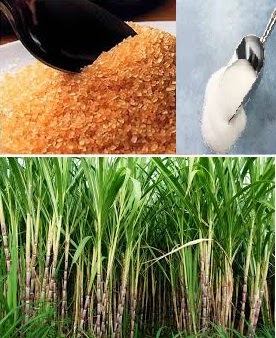At first sugar cane known by the Polynesians, then spread to India. In 510 BC, when the Indian master, King Darius of Persia find "the reed which gives honey without bees". As with many other human inventions, where sugar cane is kept secret and closely guarded, while dairy products exported and to generate huge profits.
Secrets of sugarcane finally uncovered after a massive expansion by the Arabs in the seventh century AD. When they invaded Persia in 642 AD they found sugar cane being grown and learned how sugar. During the expansion continued they established sugar production in other lands that they conquered including North Africa and Spain.

Sugar is known by those western Europe as a result of the Crusades in the 11th century. The soldiers returning home talked of this "new spice" and how pleasant it. The first sugar was recorded in England in 1099. The subsequent centuries was a period of major expansion of western European trade with the East, including the importation of sugar. For example, in a 1319 note on sugar prices in London at "two shillings a pound". This value is equivalent to several months the average wage, so that it can be said sugar is a luxury at that time.
Rich people love-making sculptures of sugar to decorate their tables. When Henry III of France visited Venice, a party held in his honor by displaying plates, silverware, and linen are all made of sugar.
Because it is expensive goods, sugar is often considered a drug. Many health instructions from the 13th century to 15 who recommend giving sugar to people with disabilities to strengthen their power.
In the 15th century, European sugar refining is generally carried out in Venice. Venice could no longer a monopoly when Vasco da Gama sailed to India in 1498 and established a trading there. Nevertheless, the discovery of the American people who have changed the consumption of sugar in the world.
In one of his first trip, Columbus brought sugarcane to be planted in the Caribbean region. The climate is very favorable for the growth of sugarcane caused the establishment of an industry quickly. The need for a large sugar to Europe led to many forest areas in the Caribbean islands became almost completely disappeared replaced sugar cane plantations, such as in Barbados, Antigua and half of Tobago. Sugarcane plants cultivated in bulk. Millions of people were sent from Africa and India to work in the sugar mill. Therefore, the production of sugar is closely associated with the slave trade in the western world.
Economically sugar is very important so that all European powers to build or trying to establish colonies on the small Caribbean islands and many battles going on for control of the islands. Furthermore, sugarcane is cultivated in large plantations in other regions in the world (India, Indonesia, the Philippines and the Pacific) to meet the needs of the European market and local.
Secrets of sugarcane finally uncovered after a massive expansion by the Arabs in the seventh century AD. When they invaded Persia in 642 AD they found sugar cane being grown and learned how sugar. During the expansion continued they established sugar production in other lands that they conquered including North Africa and Spain.

Sugar is known by those western Europe as a result of the Crusades in the 11th century. The soldiers returning home talked of this "new spice" and how pleasant it. The first sugar was recorded in England in 1099. The subsequent centuries was a period of major expansion of western European trade with the East, including the importation of sugar. For example, in a 1319 note on sugar prices in London at "two shillings a pound". This value is equivalent to several months the average wage, so that it can be said sugar is a luxury at that time.
Rich people love-making sculptures of sugar to decorate their tables. When Henry III of France visited Venice, a party held in his honor by displaying plates, silverware, and linen are all made of sugar.
Because it is expensive goods, sugar is often considered a drug. Many health instructions from the 13th century to 15 who recommend giving sugar to people with disabilities to strengthen their power.
In the 15th century, European sugar refining is generally carried out in Venice. Venice could no longer a monopoly when Vasco da Gama sailed to India in 1498 and established a trading there. Nevertheless, the discovery of the American people who have changed the consumption of sugar in the world.
In one of his first trip, Columbus brought sugarcane to be planted in the Caribbean region. The climate is very favorable for the growth of sugarcane caused the establishment of an industry quickly. The need for a large sugar to Europe led to many forest areas in the Caribbean islands became almost completely disappeared replaced sugar cane plantations, such as in Barbados, Antigua and half of Tobago. Sugarcane plants cultivated in bulk. Millions of people were sent from Africa and India to work in the sugar mill. Therefore, the production of sugar is closely associated with the slave trade in the western world.
Economically sugar is very important so that all European powers to build or trying to establish colonies on the small Caribbean islands and many battles going on for control of the islands. Furthermore, sugarcane is cultivated in large plantations in other regions in the world (India, Indonesia, the Philippines and the Pacific) to meet the needs of the European market and local.
No comments:
Post a Comment